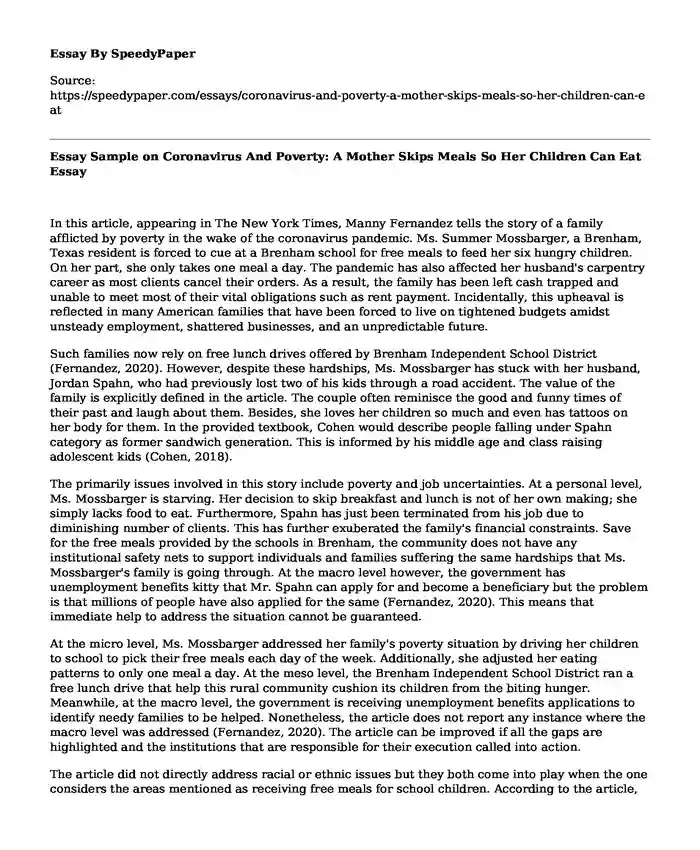
| Type of paper: | Essay |
| Categories: | Family Social change Covid 19 Social issue |
| Pages: | 3 |
| Wordcount: | 695 words |
In this article, appearing in The New York Times, Manny Fernandez tells the story of a family afflicted by poverty in the wake of the coronavirus pandemic. Ms. Summer Mossbarger, a Brenham, Texas resident is forced to cue at a Brenham school for free meals to feed her six hungry children. On her part, she only takes one meal a day. The pandemic has also affected her husband's carpentry career as most clients cancel their orders. As a result, the family has been left cash trapped and unable to meet most of their vital obligations such as rent payment. Incidentally, this upheaval is reflected in many American families that have been forced to live on tightened budgets amidst unsteady employment, shattered businesses, and an unpredictable future.
Such families now rely on free lunch drives offered by Brenham Independent School District (Fernandez, 2020). However, despite these hardships, Ms. Mossbarger has stuck with her husband, Jordan Spahn, who had previously lost two of his kids through a road accident. The value of the family is explicitly defined in the article. The couple often reminisce the good and funny times of their past and laugh about them. Besides, she loves her children so much and even has tattoos on her body for them. In the provided textbook, Cohen would describe people falling under Spahn category as former sandwich generation. This is informed by his middle age and class raising adolescent kids (Cohen, 2018).
The primarily issues involved in this story include poverty and job uncertainties. At a personal level, Ms. Mossbarger is starving. Her decision to skip breakfast and lunch is not of her own making; she simply lacks food to eat. Furthermore, Spahn has just been terminated from his job due to diminishing number of clients. This has further exuberated the family's financial constraints. Save for the free meals provided by the schools in Brenham, the community does not have any institutional safety nets to support individuals and families suffering the same hardships that Ms. Mossbarger's family is going through. At the macro level however, the government has unemployment benefits kitty that Mr. Spahn can apply for and become a beneficiary but the problem is that millions of people have also applied for the same (Fernandez, 2020). This means that immediate help to address the situation cannot be guaranteed.
At the micro level, Ms. Mossbarger addressed her family's poverty situation by driving her children to school to pick their free meals each day of the week. Additionally, she adjusted her eating patterns to only one meal a day. At the meso level, the Brenham Independent School District ran a free lunch drive that help this rural community cushion its children from the biting hunger. Meanwhile, at the macro level, the government is receiving unemployment benefits applications to identify needy families to be helped. Nonetheless, the article does not report any instance where the macro level was addressed (Fernandez, 2020). The article can be improved if all the gaps are highlighted and the institutions that are responsible for their execution called into action.
The article did not directly address racial or ethnic issues but they both come into play when the one considers the areas mentioned as receiving free meals for school children. According to the article, schoolchildren in Texas, Florida, Pennsylvania, Oregon and other states are assured of meals to cushion them from the biting hunger occasioned by the coronavirus pandemic. A closer look reveals that these are white-dominated states. Questions abound why black-dominated states such as Detroit and New Orleans' schoolchildren enjoy the same privilege.
The answered question that this article has not raised is how long this free feeding exercise will go especially considering that it is not a sustainable venture. Sooner than later, there is no doubt that even the schools will run out of food if the situation continues. What will be the fate of the schoolchildren relying on the schools' free meals?
References
Cohen, P. N. (2018). Family: diversity, inequality, and social change. New York: W W Norton.
Fernandez, M. (2020, Mar. 21). Coronavirus and poverty: A mother skips meals so her children can eat. The New York Times. Retrieved from: https://www.nytimes.com/2020/03/20/us/coronavirus-poverty-school-lunch.html?searchResultPosition=1
Cite this page
Essay Sample on Coronavirus And Poverty: A Mother Skips Meals So Her Children Can Eat. (2023, May 01). Retrieved from https://speedypaper.net/essays/coronavirus-and-poverty-a-mother-skips-meals-so-her-children-can-eat
Request Removal
If you are the original author of this essay and no longer wish to have it published on the SpeedyPaper website, please click below to request its removal:
- Center for Mediation, Free Essay Sample
- Museum Industry Essay Sample
- Essay Sample about Community Relations with Police
- The Catholic Church and Chaucer
- Essay Example on Stuttering in School-Age Children
- How the Current Pandemic Relates to the Development of Individuals. Paper Example
- Free Paper Sample: Impacts of Corona Virus Outbreak on America's Universities
Popular categories




